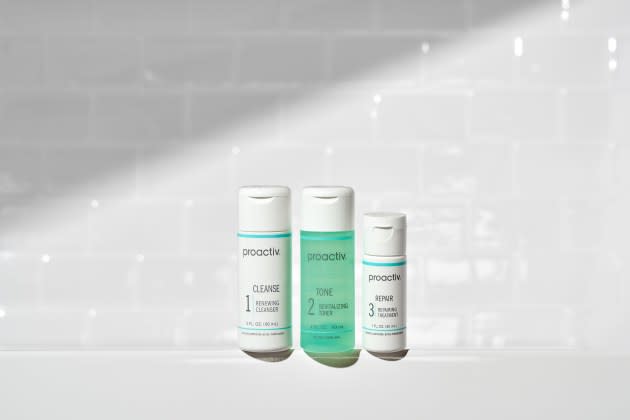The Carcinogen Benzene Has Been Detected in Products by Proactiv, Clinique and CeraVe

As consumers are increasingly conscientious about what they’re putting on their skin, a lab reported elevated levels of known carcinogen benzene in products from Proactiv, Clearasil, Clinique and CeraVe, among others.
Independent laboratory Valisure has found elevated levels of cancer-causing benzene in a range of acne treatment products — and filed a petition with the U.S. Food and Drug Administration on March 5.
More from WWD
The petition is calling on the government agency to “issue a regulation, revise industry guidance and request a recall and suspend sales of benzoyl peroxide from the US market and take such other actions,” per the filing.
Valisure tested 66 acne treatment products with benzoyl peroxide by incubating them at 50 degrees Celsius for 18 days, and then tested levels of benzene on the first, fourth, 10th, 14th and 18th days.
“The findings presented by an independent lab today reflect unrealistic scenarios rather than real-world conditions,” said a spokesperson for Clearasil parent company Reckitt. “Reckitt is confident that all Clearasil products, when used and stored as directed on their labels, are safe.”
In 2022, Valisure had also found benzene in dry shampoos, sparking both headlines and recalls of products from Dove, Nexxus and TRESemmé, resulting in class-action suits being brought against product manufacturer Unilever.
In 2019, the lab reported high levels of another carcinogen, NDMA, in heartburn drug Zantac; that resulted in a letter from the FDA to Valisure criticizing its testing methods, and a judge threw out lawsuits against Zantac manufacturers.
Benzene has been classified as carcinogenic to humans by the Department of Health and Human Services, and use is restricted to two parts per million. By contrast, on the 14th day of testing, a Proactiv cream with 2.5 percent benzoyl peroxide tested for nearly 1,800 parts per million of benzene. A Clinique cream with the same percentage tested for nearly 400 parts per million of the chemical.
“At Clinique, rigorous safety is our highest priority. Benzene is not used as an ingredient in any product across The Estée Lauder Companies’ brand portfolio,” a company spokesperson said. “Benzoyl peroxide, an FDA-approved and commonly used ingredient for acne treatment, is not benzene. Clinique uses benzoyl peroxide in one product. This product, like all of our products, is safe for use as intended. No other product in The Estée Lauder Companies’ portfolio contains benzoyl peroxide.”
Spokespeople for the manufacturing companies behind other products, including L’Oréal and Proactiv, did not immediately respond to requests for comment Wednesday.
Product safety has become a growing concern for consumers. Last year, hair care brand Olaplex saw sales drop following a lawsuit claiming that those products caused personal injury. Although the suit was eventually dismissed, that business’ sales are still recovering.
“While product efficacy is important, brand and product perception is often the most powerful in driving consumer purchase decisions. We have seen numerous of examples where change in brand perception led to a significant decline in sales. For example, Olaplex and concerns around products resulting in hair loss. Despite being disproven by the company, sales remain pressured and require significant marketing to rebuild the brand perception,” said Jeffries analyst Ashley Helgans in a note regarding the petition. “Due to the severity of Valisure’s findings, there is significant risk to the brands listed in the petition.”
At press time, shares of the Estée Lauder Cos. had slid around 1.2 percent. Shares of L’Oréal were largely flat, posting a 0.8 percent gain.
Best of WWD

